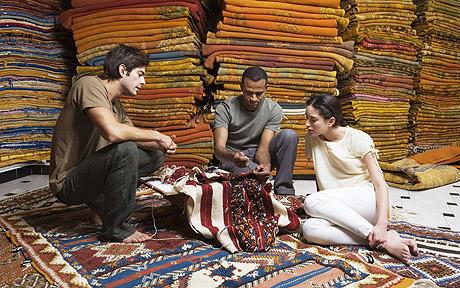Sometimes, we buy things just for ourselves, hoping to make the memory of our trip last longer. I am frequently guilty of this act. I like to buy one thing from a trip to place on my bookshelf. I have a little llama figurine from an Ecuadorian market, a wooden turtle from Jamaica, a red mosaic-tiled bull from Spain, a jade Buddha from Chinatown in San Francisco, and so on. Sometimes photos just aren't enough; I like to walk by and see something tangible from the places I have been.
haggle [hag-uh l]
1. to bargain in a petty, quibbling, and often contentious manner: They spent hours haggling over the price of fish.
2.to wrangle, dispute, or cavil: The senators haggled interminably over the proposed bill.
3. to mangle in cutting; hack.
4.to settle on by haggling.
This definition of haggling is a bit reductive though. When used properly, haggling can be carried out in a manner that is both dignified and respectful, while still satisfying both the tourist and the vendor.
Often vendors expect tourists to haggle, and intentionally overprice their items in advance of the sale. When you find an item you are interested in buying, think what you would be willing to pay for the item before you ask or look at the price, if possible. Having that number in your head will help you once you find out the items actual price. If it is lower than you expected, great! Get it! Sold! If it is waaaaaay higher than you expected, move on. Even with haggling, you will most likely not be able to get the vendor down to the price you have in mind. If the price is near what you hoped, but just a bit more than you are willing to pay, now is the time to haggle.
-If they say no, and don't offer any counteroffer, they probably will not budge. Now you need to decide whether it is worth more than you want to pay for it, or if its better to just walk away.
-If the vendor says no, but offers a counteroffer that is lower than the original price, now is the best time to haggle since you know the vendor is willing to bargain.
-Think about the price for a minute, with a frown or furrowed brow.
-Offer up another counteroffer, in the range between the you and the vendor's offered prices. Repeat if needed.
-Once the vendor agrees to a price you are happy with, the haggle is over.
A few tips:
-Be respectful, and smile. People are always more receptive to friendly people, and they will be more willing to interact with you.
-Be honest with yourself about the worth of the item to you and to the vendor. You can't expect a vendor to sell you a scarf for $1 when he is selling them for $20 each.
-Sometimes, telling the vendor you only have enough money for the price you offered will get them to agree to your price.
-If all else fails, saying "no, thank you" and walking away can prompt the vendor to rethink his offer and call you back to negotiate further.
-You can often get the vendor to give you a discount on multiple items for one lump sum.
When not to haggle:
-If you are buying services or food (quality of service will be diminished, and you should never mess with the people who cook/bring you your food). The exception is at a farmers market, or any place where you can already see the food you are bargaining for.
-just for the sake of haggling. If the price is right, the price is right, and remember that the vendor has to make a profit on the sale too.
-If the item is really special, like something that you know the vendor himself/herself has handmade. Haggling could be an insult in this instance.
-If you are a millionaire (C'mon, you can afford it anyways).
Wikitravel has a good article on haggling, with a few additional tips here: Wikitravel - How to haggle


No comments:
Post a Comment